Key takeaways:
- Financial advisors prioritize understanding clients’ goals and provide tailored advice as strategic partners.
- Financial education empowers individuals, helping them avoid misconceptions and make informed decisions.
- Diversification and long-term thinking are essential strategies for successful investing, especially in volatile markets like cryptocurrency.
- Engagement and communication with advisors and communities enhance understanding and confidence in investment decisions.

Understanding Financial Advisors
Understanding financial advisors involves recognizing the diverse roles they play in guiding our financial decisions. When I first met my advisor, I was surprised by how much emphasis he placed on understanding my financial goals rather than pushing products. It made me think: Isn’t it crucial to have someone who truly listens to your aspirations before making recommendations?
As I navigated through my investment journey, I realized that a good financial advisor doesn’t just provide advice; they act as a strategist. One of my advisors once said, “Investing is like a puzzle, and I’m here to help you find the right pieces.” This approach resonated with me deeply and revealed how important it is to work with someone who helps us piece together our financial future in a way that aligns with our life goals.
Moreover, there’s an emotional aspect to working with financial advisors that can’t be overlooked. I vividly recall a time when I faced a tough decision about liquidating an investment during a market downturn. My advisor’s calm demeanor and thoughtful analysis helped ease my anxiety. It made me question: How essential is it to have someone experienced during volatile times? In my experience, their support can provide both financial insight and a sense of security, which is invaluable in today’s unpredictable market.
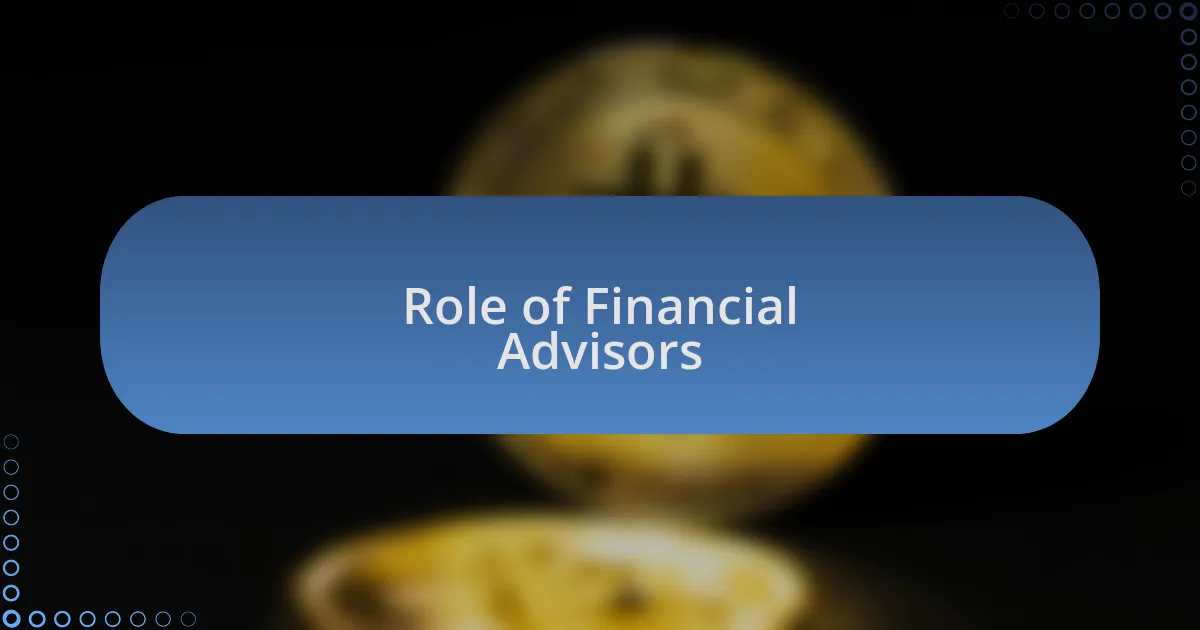
Role of Financial Advisors
Financial advisors serve as vital navigators in the often-murky waters of personal finance. I remember when I was first introduced to the world of investment; my advisor didn’t simply hand me a portfolio and offer vague advice. Instead, they took the time to educate me about different asset classes and what they meant for my specific situation. This tailored approach made it clear to me that a financial advisor is not just a provider of information, but a mentor who empowers clients to make informed decisions.
One aspect I value is their role in risk management. Reflecting on a steep market drop, my advisor encouraged me to analyze my risk tolerance more deeply. It made me wonder: How often do we assess what we’re comfortable with, rather than just chasing high returns? Through candid discussions, my advisor helped me appreciate the balance between growth and security, creating a smart investment strategy that matched my personal values and financial goals.
Ultimately, a solid financial advisor becomes a trusted partner in achieving long-term financial wellness. I once faced a life-altering financial decision—choosing between a risky venture and a stable investment. My advisor not only provided insights but also took the time to understand my fears and aspirations. This experience taught me that the best advisors don’t just give advice; they build lasting relationships that foster trust and collaboration. In today’s complex financial landscape, having that ally by your side can make all the difference.
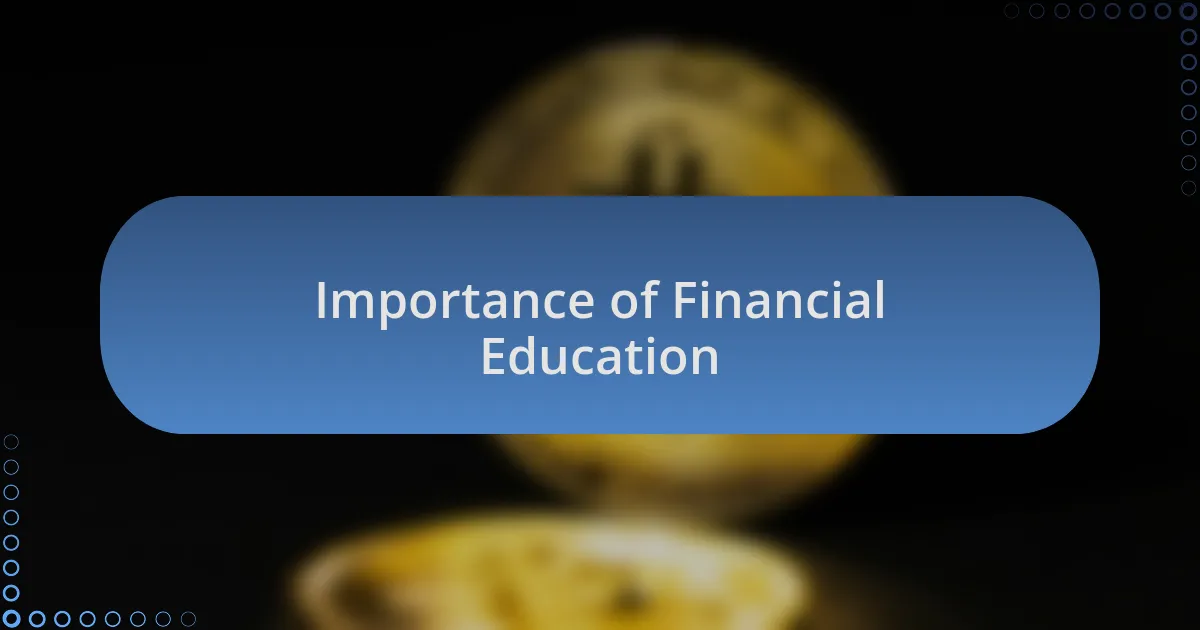
Importance of Financial Education
Financial education is essential for anyone looking to take control of their financial future. I recall a time when I realized I had been making choices based on misconceptions rather than solid knowledge. This epiphany emphasized that understanding financial concepts, from budgeting to investing, allows us to avoid common pitfalls and seize opportunities with confidence.
Without a solid grasp of financial principles, people can easily feel overwhelmed and lost, especially with the proliferation of complex investment options. I vividly remember attending a seminar once where the speaker outlined the basics of compound interest. It was a lightbulb moment for me—how could such a simple concept have such powerful implications for wealth building? It reinforced my belief that financial literacy not only empowers individuals but also fosters a sense of security in an unpredictable world.
Engaging with financial education can invigorate our decision-making. For example, after taking the time to attend workshops and read insightful books, I found myself more equipped to ask the right questions. It made me consider: How can we expect to make informed choices without a foundational understanding of the tools at our disposal? This realization deepened my commitment to continuous learning, illustrating just how pivotal financial education is for achieving long-term goals.
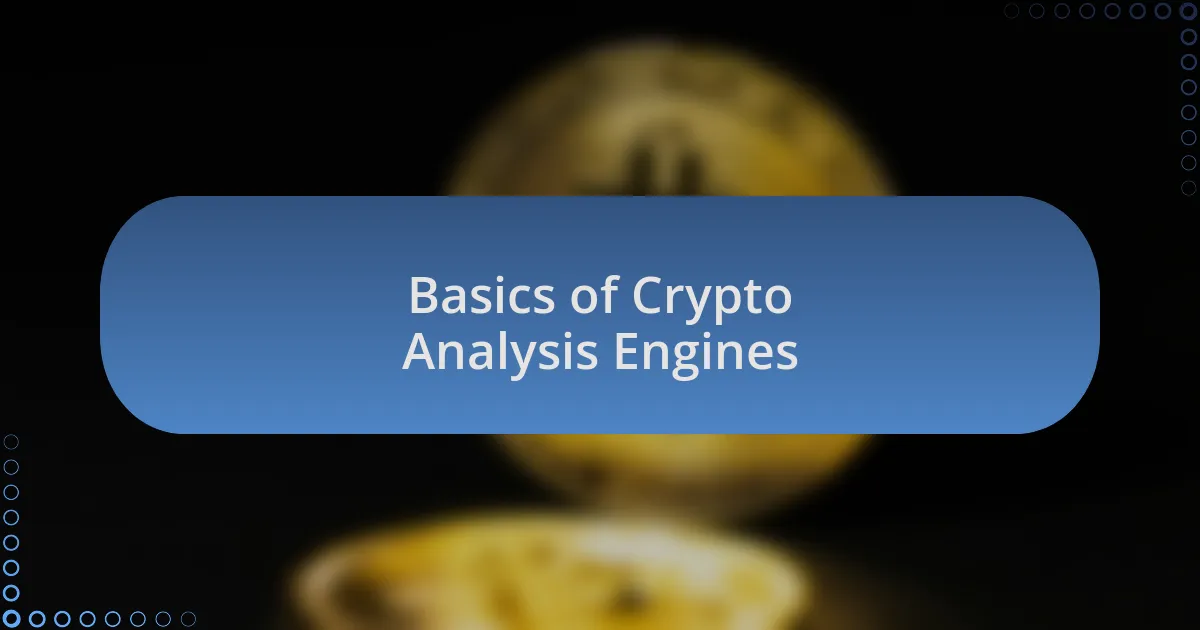
Basics of Crypto Analysis Engines
Crypto analysis engines are tools that help investors make sense of the vast and often volatile cryptocurrency market. They aggregate data, analyze market trends, and provide insights that can be crucial for making informed decisions. I remember my first experience using one of these engines; it felt like having a translator in a foreign country, making complex data not only accessible but also actionable.
These engines typically leverage advanced algorithms to track price movements, trading volumes, and other key indicators. I was once overwhelmed by the sheer amount of information available on cryptocurrency prices. Using a crypto analysis engine not only simplified my research but also highlighted trends I might have missed, such as market sentiment shifts that could signal the ideal time to buy or sell.
Moreover, many crypto analysis engines offer features like real-time alerts and customizable dashboards, catering to different investment strategies. I can’t help but think about how much easier my trading decisions would have been had I utilized these tools earlier. It begs the question: how can we navigate the fast-paced world of crypto confidently without harnessing the power of such analytical tools?
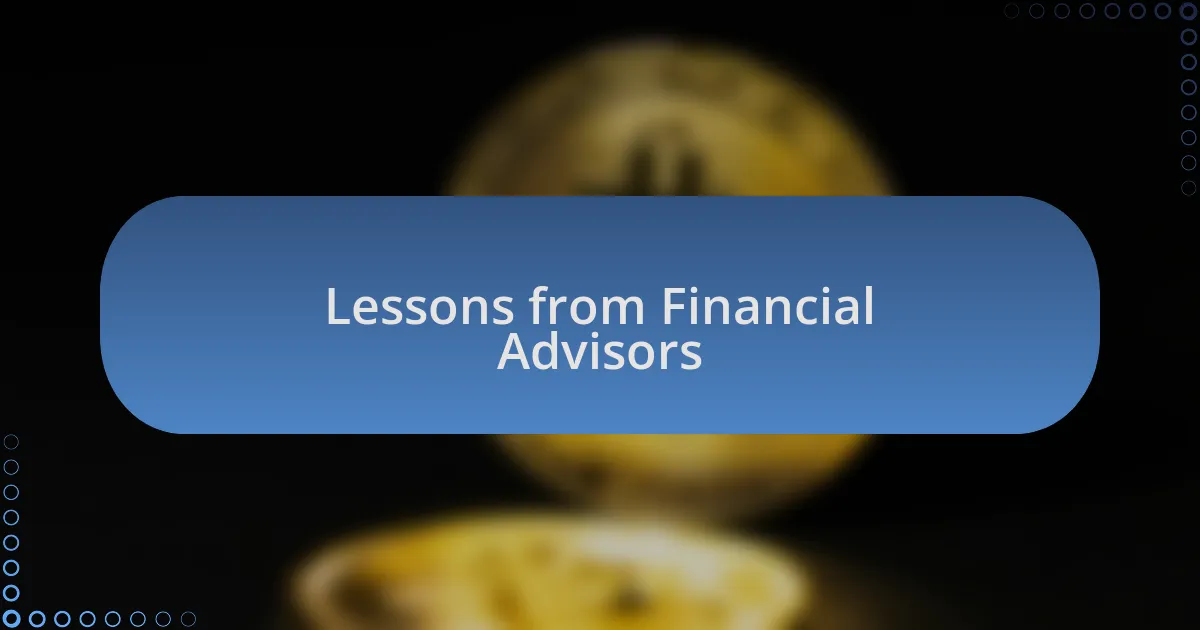
Lessons from Financial Advisors
In my conversations with financial advisors, one key lesson stood out: the importance of diversification. When I first started investing, I thought putting all my money into one cryptocurrency was a winning strategy. However, my advisor pointed out that spreading investments across different assets, including more traditional ones, could mitigate losses and stabilize returns. Have you ever felt the dread of watching a single investment plummet? I sure have, and diversification has since become a cornerstone of my investment strategy.
Another significant insight I gained is the value of long-term thinking. Financial advisors often emphasize that the market is inherently volatile. Early on, I was tempted to react impulsively to daily price swings, but my advisory team’s guidance taught me to focus on my overall financial goals instead. I remember a particularly stressful period when the market dipped drastically; instead of panic selling, I chose to stick it out. That experience reinforced my belief in patience and strategic goal-setting, something I wish I had prioritized from the beginning.
Regular communication with a financial advisor has also proven invaluable. I recall a time when I was unsure about diversifying into new assets, feeling overwhelmed and hesitant. My advisor helped clarify my doubts, breaking down complex concepts into manageable bites. This ongoing dialogue not only bolstered my confidence but also deepened my understanding of the financial landscape. In what ways do you engage with your financial advisors? Their perspectives can be the anchor you need during turbulent times.
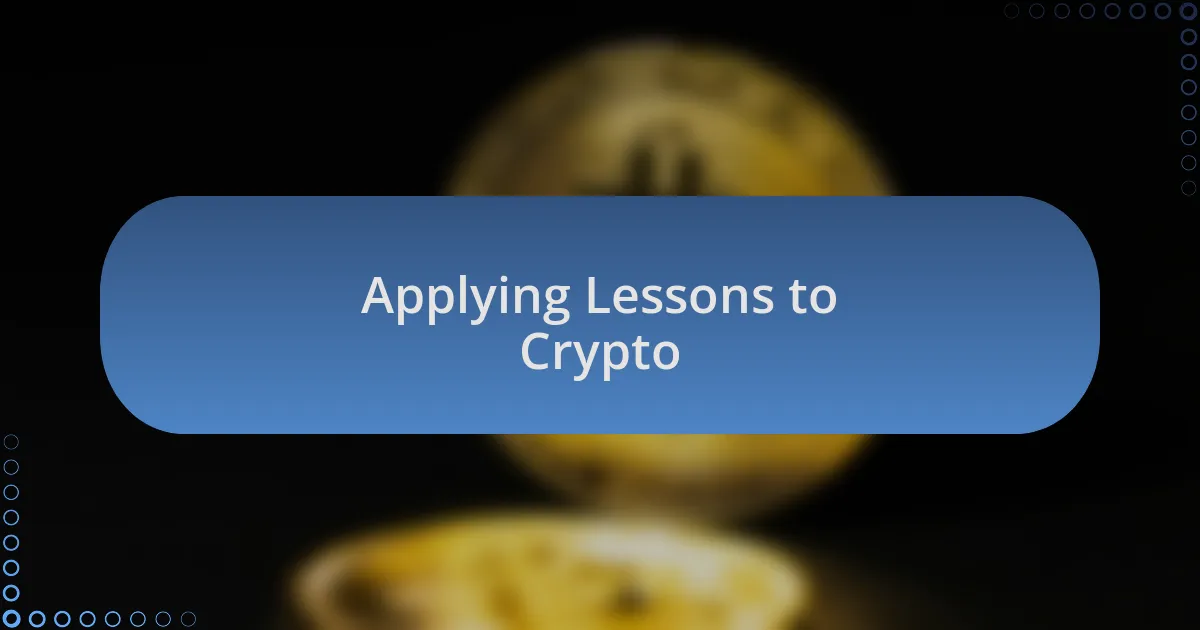
Applying Lessons to Crypto
Applying the principle of diversification to my crypto investments has been a game-changer. I remember when I concentrated heavily on one coin, convinced it was the next big thing. As its value plummeted, I felt that sinking feeling of regret. Now, I ensure that my portfolio includes a mix of established cryptocurrencies and emerging tokens. Spreading my investments has not only eased my anxiety but has also led to more balanced growth.
Long-term thinking is another lesson I carry into the crypto space. The impulse to sell during dips is strong, especially with the erratic price movements common in this market. I recall the tense moment when I watched my favorite coin drop by 20%. Instead of selling out of fear, I took a step back and remembered my long-term strategy. This moment crystallized for me the importance of maintaining a cool head and sticking to my broader goals, instead of reacting to the fleeting ups and downs.
Communication remains essential, even in the decentralized world of crypto. I often turn to online forums and community discussions to gauge new trends and shifts in the market. I once hesitated to invest in DeFi projects until I joined a knowledgeable group where experiences were shared freely. Hearing firsthand accounts and seeking advice from those who had ventured ahead of me helped me feel more secure. How do you seek guidance in the world of cryptocurrency? Engaging with others can illuminate paths you might not have considered before.
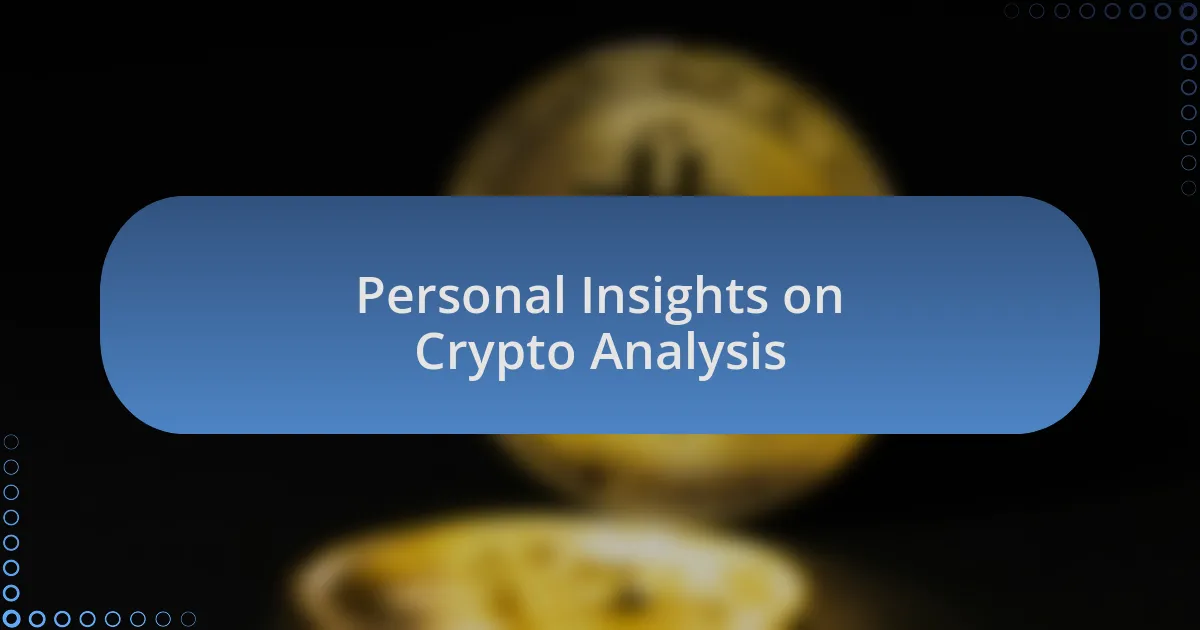
Personal Insights on Crypto Analysis
There’s something invigorating about analyzing crypto trends that regularly draws me into the numbers and charts. I once spent an entire weekend diving deep into the performance metrics of a lesser-known token. The thrill of uncovering rising patterns felt like discovering hidden treasures. Have you ever had that moment where a simple chart shifts your perspective? Realizing the potential behind data can be a powerful motivator in shaping investment strategies.
In my experience, it’s not just the quantitative data that matters; the qualitative insights play a significant role too. I vividly recall investing in a project after attending a virtual conference where the developers spoke passionately about their vision. Their enthusiasm instilled confidence in me, demonstrating that human elements can sometimes outweigh cold, hard data. Don’t you think there’s value in trusting the stories behind the numbers?
Another thing I’ve learned is the importance of adapting to new information and changing market conditions. I remember facing a rough patch with my investments when regulatory news broke in my home country. Instead of panicking, I took time to reassess my approach and re-evaluate the foundational principles of the projects I supported. How do you pivot when faced with sudden changes in the crypto landscape? Embracing adaptability ensures I stay grounded, no matter the swings the market takes.